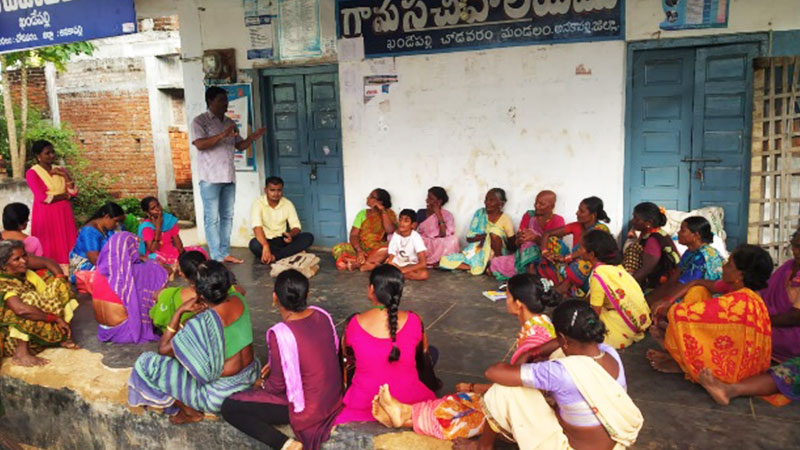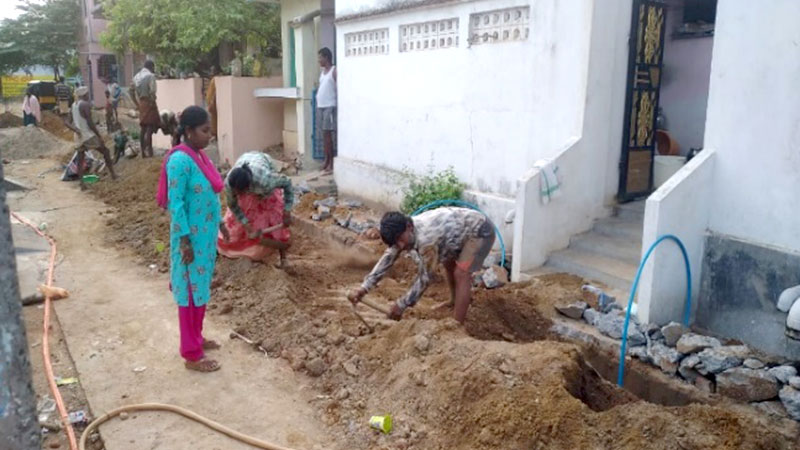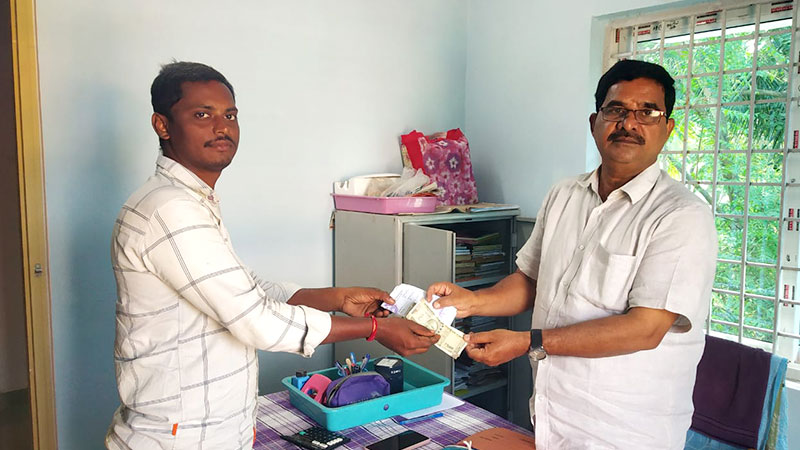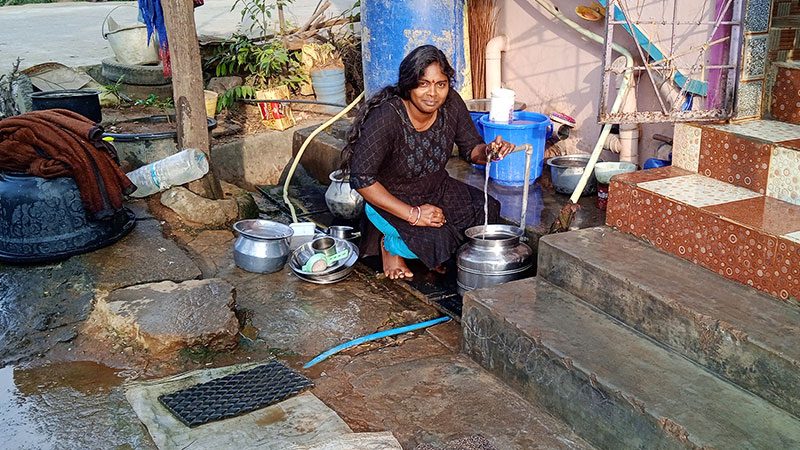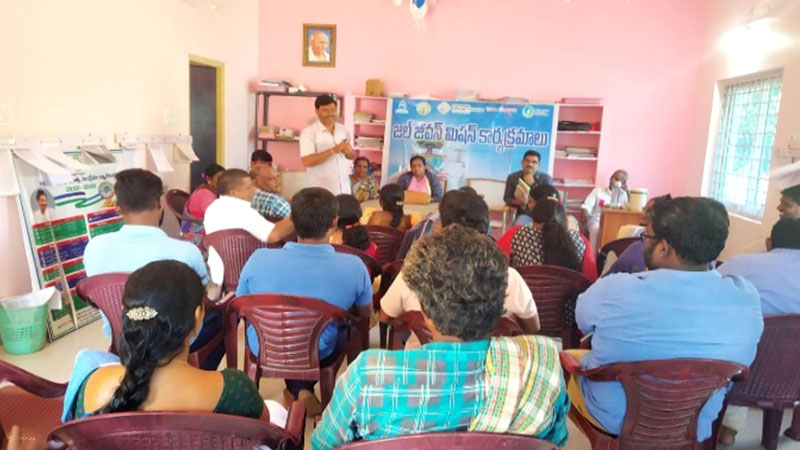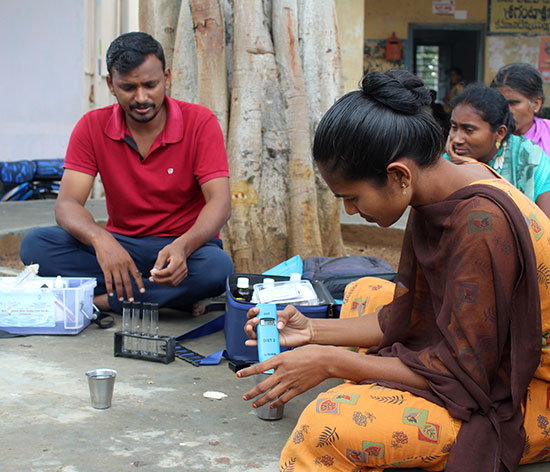
Khandepalii is a small village in Chodavaram Mandal of Anakapalle district in Andhra Pradesh, inhabited by 595 households. The village has two overhead service reservoirs of 60,000 and 40,000 litres and 25 functioning hand pumps. The water is hard and can only be used for domestic purposes. Up until a year ago, none of the villagers possessed a household tap connection and were dependent on community or street hand pumps for obtaining water for drinking and domestic purposes. Non-availability of water at their homes meant a life of drudgery for the villagers; the women had to stand in queues at the hand pumps to draw water in the pouring rain or blazing sun. At times, petty fights would erupt. Awareness of a better quality of life led to the villagers making a decision to improve their existing situation; however, no easy solution was in sight.
Things took a turn for the better in October 2021 when the Jal Jeevan Mission (JJM) was introduced to the villagers by Vijayavahini Charitable Foundation (VCF), an associate organisation of the Tata Trusts working in the state to enhance the lives of disadvantaged communities. “As an Implementation Support Agency (ISA) of the JJM, VCF first initiated meetings with stakeholders, during which salient features and objectives of the JJM were explained, along with the roles and responsibilities that each of the stakeholder was expected to fulfill,” explains Rajendra Ravuri, Regional Manager, Andhra Pradesh, Tata Trusts.
“VCF held separate meetings and conducted awareness activities with women from self-help groups, youth groups, and even with children and retired folks of the village, in which they spoke about the JJM, its objectives and importance,” reveals Laveti Arjunamma, a resident of Khandepalii, when asked about the sequence of events that finally brought water to their doorsteps. “A series of meetings and discussions were conducted and a Village Water and Sanitation Committee (VWSC) was established in October 2021 as per the JJM guidelines. VCF also organised trainings for the VWSC members, helping them understand their roles and responsibilities,” shares Manoj Kumar, WaSH Expert, VCF.
The VWSC developed the Village Action Plan (VAP) with the help of VCF and submitted it to the Rural Drinking Water and Sanitation Department (RWS&S) for approval. Subsequently, Rs47.5 lakh was sanctioned to the village under the JJM project, which was deposited into a separate bank account created in the name of the VWSC.
Before the onset of the work by the contractor, the VCF team also organised a block-level multi-stakeholders’ meeting, attended by Gram Sarpanches, officials from the RWS&S department, VWSCs and contractors. Mr Ravuri says, “The meeting ensured clarity on the roles and responsibilities of each stakeholder, whilst also facilitating co-operation for smooth implementation and successful completion of work. The RWS&S department played a key role in infrastructure development. The VWSC supervised the work undertaken by the contractor and retrofitting of the system. Consequently, every household got a tap connection.”
Senapati Rajapsekhar, Chairman, VWSC and Sarpanch says, “Issues did crop up during the course of the implementation of the scheme, but the VWSC was able to amicably resolve them through regular meetings and discussions with the concerned parties.”
VCF conducted training sessions for the stakeholders, one of which focused on the importance of monitoring the water quality and Operation and Maintenance (O&M) of the schemes. “Mere installation of taps in every household wasn’t the main outcome; the key objective was ensuring households receiving 55 LPCD of water as per JJM guidelines, besides addressing issues related to O&M,” emphasises Mr Kumar.
In a Gramasabha, the VWSC passed a resolution for the contribution of Rs1,000 from every household towards the community contribution. VWSC members took the responsibility of collecting community contributions and were amongst the first to contribute. They visited each household to illustrate the importance of their contribution towards ensuring sustainability of the water scheme. Encouragingly, till date, Rs79,000 has been collected, making this the first such initiative in Andhra Pradesh. The VWSC and its volunteers also played an important role in resolving political issues, besides cases of non-acceptance among the villagers and petty arguments.
Presently, the VWSC is in the process of solving issues related to source sustainability, creation of new sources and addressing irregularities in water pressure and quantity. An elated Senapati Rajasekhar says, “Tata Trusts’ VCF team played a pivotal role in building awareness, community mobilisation, and extended hand-holding support to VWSC in each and every step to attain its goal. Now, we want to ensure that Khandepalii becomes a model village under the JJM, wherein safe and adequate water is provided to all households, whilst also ensuring source sustainability.”
